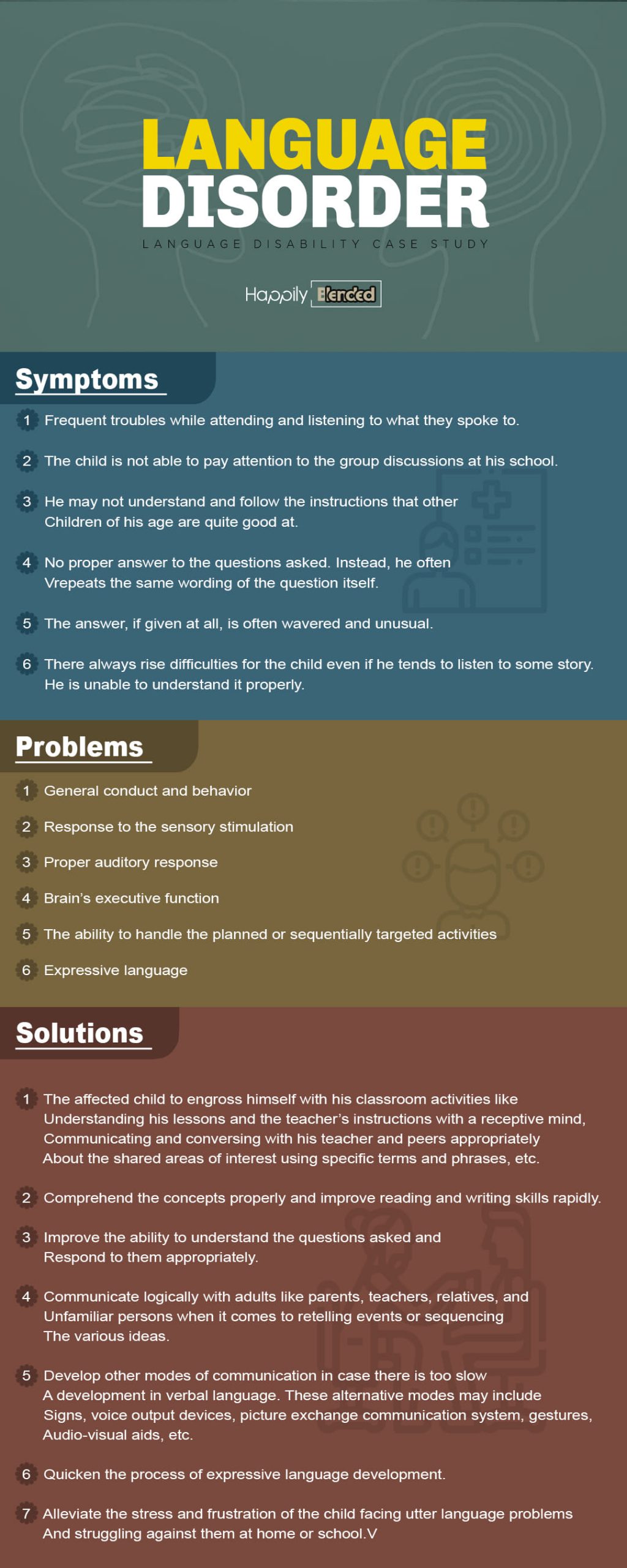Understanding your mother tongue is natural, but possible only when you don’t have any language disorder. Being able to comprehend and analyze what you are spoken to is the basis of a receptive language.
Last year, a cousin of mine got much worried when she noticed that her son of four was still unable to speak properly. She also observed that her son always gave poor responses to whatever spoken to him. She consulted several physicians and therapists and immediately starts getting her son treated and recovered. With the hard efforts of the professionals and the kind cooperation of the whole family, her son is now well recovered. Following is what she deduced about the whole problem of receiving the language improperly.
What is a receptive language disorder in actual?
The ability to pick words, phrases, sentences, body gestures, signs of sound and sight is called receptive language and any malfunction in this regard is what we call receptive language disorder. Unable to pick the oral language comprehensively, a few children seem to understand the things spoken to them with the help of keywords and the visual aid from the surroundings.
The importance of receiving a language properly
No successful communication can result in proper receptive language. It always proves difficult for victimized children to understand the questions or requests made to them at home or school. Consequently, they are unable to pay full attention to the on-goings there which, in turn, raises a lot of behavioral issues on their part. Owing to the poor understanding of language, several students cannot grasp their curriculum and focus on their academic activities. As a result, they always lag not only in studies but also in their family and social dealings.
What factors develop a real sense of language?
The natural development of receptive language disorder direly required in every individual and any delay in this regard brings complications and difficulties for the victim. The chief-most factors involved in its development are:
1. Full Heed and Focus
Through consistent efforts to understand something without any distraction and the ultimate attention towards what is underway to be through successfully are the foremost signs of a receptive language.
2. Fore-language skills
Ways of communication without using words are also vital in this connection. They are the pre-requisites of language which enhance the mental faculties to pick and learn the actual language. These include signs, gestures, eye contacts, face expressions, imitation, etc.
3. Social skills
The ability to interact with other members of the society either verbally or non-verbally and to recognize and follow the social norms is a key factor in the development of receptive language.
4. Performing skills
These are the abilities to undertake the self-motivated activities involving fun and pleasure. These show the readiness of the mind to accept the various changing scenarios and adjust accordingly. Such activities may or may not be target oriented.
What symptoms may develop if there are problems with the reception of language?
Depending on the child’s age, the following symptoms may appear and vary if there is some problem with receptive language.
- Frequent troubles while attending and listening to what they spoke to.
- The child is not able to pay attention to the group discussions at his school.
- He may not understand and follow the instructions that other children of his age are quite good at.
- No proper answer to the questions asked. Instead, he often repeats the same wording of the question itself.
- The answer, if given at all, is often wavered and unusual.
- There always rise difficulties for the child even if he tends to listen to some story. He is unable to understand it properly.
What other problems associates with Receptive Language Disorder?
The children suffering from difficulties regarding receptive language disorder also have problems with:
1. General conduct and behavior
Such children do not behave properly in the classroom and create extreme disturbance for the teacher and the fellows. This is because they are unable to understand and focus on whatever the teacher is saying or instructing.
2. Response to the sensory stimulation
There is a natural mechanism to register, interpret and respond to the sensory stimulation outside or inside the body. The children with poor receptive language grip lack in this sensory processing and, hence, have to face a lot of problems.
3. Proper auditory response
Despite being able to hear sounds, they cannot distinguish between similar words and sounds and are particularly unable to recognize or separate their relevant sound from a noisy background.
4. Brain’s executive function
Their brain is too weak to think skillfully and suggest higher-order reasoning. So, they are not able to decide executively what to do next.
5. The ability to handle the planned or sequentially targeted activities
With the poor receptive language, the child is never able to undertake a multi-step sequential task or even a joyful game and collapses just after a single step.
6. Expressive language
Such children often have severe problems with their expressive language as well. Their receptive and expressive language disorders never allow them to speak properly and sensibly and tell their needs and thoughts or ideas. Besides, this weakness also hinders them to read and write accurately.
Why is it necessary to undergo therapy?
No doubt many other helpful activities may improve the severe or extreme symptoms daily, but a regular treatment still required and advisory to recover the problems with receptive and expressive language. Through the application of his/her effective therapeutic techniques, the professional therapist will help:
- The affected child to engross himself with his classroom activities like understanding his lessons and the teacher’s instructions with a receptive mind, communicating and conversing with his teacher and peers appropriately about the shared areas of interest using specific terms and phrases, etc.
- Comprehend the concepts properly and improve reading and writing skills rapidly.
- Improve the ability to understand the questions asked and respond to them appropriately.
- Communicate logically with adults like parents, teachers, relatives, and unfamiliar persons when it comes to retelling events or sequencing the various ideas.
- Develop other modes of communication in case there is too slow a development in verbal language. These alternative modes may include signs, voice output devices, picture exchange communication system, gestures, audio-visual aids, etc.
- Quicken the process of expressive language development.
- Alleviate the stress and frustration of the child facing utter language problems and struggling against them at home or school.
What type of therapy should we choose?
Depending upon the nature of affected functional areas of concern and the degree of malfunctioning, the type of therapy should be chosen. There are chiefly two types of therapies namely:
- Speech therapy
- Occupational therapy
If multiple areas of concern get effects and the disorder has reached beyond the level of understanding words or phrases, both the therapies are essential to bringing smart results the soonest.
What supportive activities should be there at home for the quick recovery?
- Eye-to-eye contact proves very effective and boosts up confidence within the child, making him well attentive for the upcoming instructions.
- Much simplified language must be used by parents, teachers and other members of the society to make it easy for him to understand.
- The least number of instructions will simplify the things and make it easy for the affected child to remember and follow them in true letter and spirits. Never give too many at a time.
- Numbering the instructions in order using ‘first’, ‘second’, ‘third’, ‘then’, etc. make them quite understandable for the child to act upon them accordingly.
- Repetition of what was spoken before also facilitates the child to comprehend things more clearly.
- Chunking the verbal instructions proves very much suitable for a child with a receptive language disorder. Instead of saying “Come in and take your book to start reading loudly”, one must say, “Please come in.” When he has come in, say to him,” take your book please.” Then he should be asked, “Now start reading loudly.”
- Clarification regarding the instructions given to the child is as much important as the instructions themselves. Possibly he may have forgotten some part of them or has difficulty comprehending them fully well. He must be encouraged to ask them again to get them clarified.
- Letting the child play with toys regularly and having a healthy discussion with him about the toys and how he is using them so that his process of learning may proceed fast.
- Reduction in the background noise will make a big difference to his ability to understand the concepts without getting distracted from anything else.
- Performing various activities physically before the child to make him understand how he supposes to follow the instructions practically.
- Assisting with visual aids like signs, pictures, gestures, facial expressions, body language, etc. It also helps the child comprehend and recall the instructions easily.
- Describing and emphasizing different aspects of a word makes its concept quite clear to the child and he comes to know how to use this word in different settings. For example, “lights are on”, “Kindly move on”, “The pen is on the table” convey a varied use of “on” which must be clear to the child so that he may use it accordingly.
- Taking help from the books also creates a difference in the child’s understanding of the language. Looking at different pictures and discussing them along with the stories involved make the child think and link up the various segments sensibly both in his mind and speech.
- Naming the different things together when you see them while traveling in your car, shopping from the market, scrolling a book, etc.
- Explanation of the new concepts is very much helpful in developing an understanding of the language. You may also explain a new concept with the help of a practical presentation before the child.
What a child will have to face if left with his language problems unsolved?
With an untreated receptive language disorder, the affected child will have sheer difficulties in:
- Building up friendships and positive social dealings with his class fellows, cousins, etc.
- Accomplishing his academic tasks including tests, exams, assignments, etc.
- Handling job applications and interviews properly.
- Acquiring appropriate reading and writing skills.
- Locating a new place and passage as well as guiding others about some address.
In the end, we recommend getting a receptive language disorder of your ward diagnosed and treated at the earliest.




